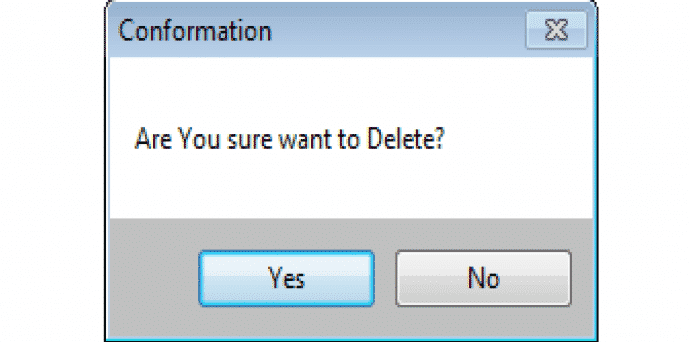Table Of Contents
Have you ever thought what really happens when you delete data on the Internet?
Many a times we post something on our Facebook or Twitter wall only to realise the post is dumb enough to be deleted. If you thought that after your deleting the data, it is done and dusted, you are wrong. Anything that one posts on social media is not private. What about the awkward Facebook statuses or tweets that you may have posted years ago but have deleted since? Can you ever actually remove something from the Internet?
The answer to this question is largely a grey area as no one can be absolutely sure about it.
Behnam Dayanim, Esq., a Washington, D.C.-based lawyer who specializes in privacy and cyber security, says, “Whether or not something is deleted isn’t within the user’s control.”
For instance, take a regular email. When you delete it from your inbox, it goes to a “Deleted Items” folder. You permanently kill that message from your end by emptying that folder.
However, Dayanim says that even a double-deleted item could remain on your email provider’s servers for an unspecified amount of time.
He further adds that there also chances that your details could wind up in the hands of hackers in the event of a security breach. This implies for all social media posts, emails, and text messages, too.
Since you have given clear permission to these companies to hold on to your data at the time of agreeing to their ambiguous privacy policies, you cannot do much about this.
Here’s a sample of what basically do those policies say:
The world’s largest social network website saves your data for “as long as necessary to provide products and services to you and others.” This in reality means your deleted data is never really deleted from Facebook servers.
Gmail
Google’s Gmail also follows a similar polity to Facebook. Gmail “may not immediately delete residual copies from our active servers,” after you delete an email.
Twitter doesnt have a forthright answer to this question. It doesn’t state on what it does when you delete a Tweet, but says that “search engines and other third parties may still retain copies of your public information, like your user profile information and public Tweets, even after you have deleted the information from the Twitter Services or deactivated your account.”
Snapchat
When you view a snap, it’s automatically deleted from the company’s servers—in “most cases.” It doesnt however stipulate exactly in which cases the images are saved. Snapchat “can’t guarantee that the messages will be deleted within a specific timeframe” and says your snap “may remain in backup for a limited period of time.”
Instagram owned by Facebook is as ambiguous as its parent about the content deletion policy. The photo sharing site says it may hold information for “a commercially reasonable time for backup, archival, and/or audit purposes.”
As mentioned earlier, it is very ambiguous. Dayanim says that the common link is that companies can recover your data based on particular circumstances, like requests from law enforcement or a subpoena.
Are you freaked out by this? Don’t worry, Cyberdust will ease some of your fear. This Mark Cuban-backed app, which is free for iOS, Android, and Windows platforms asserts to permanently wipe every message you send within 100 seconds of recipients reading it, which also includes the company servers.
Hopefully, you have not posted anything that could land you in trouble or in jail. It’s more realistic to make a social media blunder that risks your job—like the people behind these recent scandals. Warning…don’t follow their footsteps.
• In 2013, PR consultant Justine Sacco Tweeted a cheap joke: ‘Going to Africa. Hope I don’t get AIDS. Just kidding. I’m white!’ Thousands of angry people had replied to the Tweet by the time she got off her 11-hour flight, and the hashtag #HasJustineLandedYet was trending globally.
Sacco lost her job soon after the blunder. She’s the subject of Jon Ronson’s recent book, So You’ve Been Publicly Shamed.
• Earlier this year, Rory Cullinan, former chairman of the Royal Bank of Scotland, was sacked from his position after his daughter posted screenshots of their private Snapchat messages to her Instagram account. Cullinan sent snaps from his office, with captions like “Another friggin meeting.” While it appeared innocent, Cullinan was, however, fired weeks later.
• In 2011, the British Ministry had dismissed a Buckingham Palace guard of his duties of guarding the Royal Wedding after he posted comments about Kate Middleton on his Facebook page, calling her a “posh bitch” and “stupid stuck-up cow.”
• In 2014, James Franco messaged a 17-year-old on Instagram, asking if she was single and wanted to meet up. When the girl asked him to prove that it was Franco, which the actor provided—then posted screenshots of the exchange on Imgur.
Franco copped to the exchange, but got a shabby reputation for chatting up teens.
• Recently, Amy Pascal, one of Hollywood’s most powerful executives, resigned from her role as head of Sony’s movie division after hackers leaked private emails between her and other producers late last year. Pascal in her messages had made racially insensitive comments about Barack Obama and disrespected celebrities like Angelina Jolie.
In the end, every time you are about to send something out, you need to ask yourself a few important questions: Will this get me fired? Will it hurt my chances of getting in the future? Will it offend someone?
If your status, photo, or text cannot pass the above set of questions, then it is most likely not worth posting it.
Source: Men’sHealth

